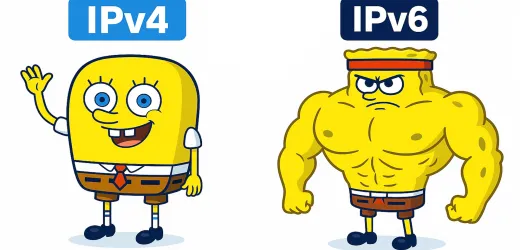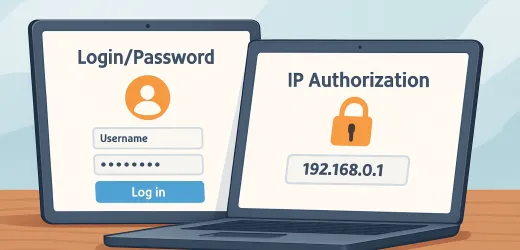We've already covered the proxy protocol version and the proxy traffic delivery protocol. Now the question arises: what are Shared, Anonymous (Private or Individual), and Premium (Elite) proxies? Proxies themselves are not a complex technology, but they have many nuances that affect the choice.
Answer: These are proxy subtypes. The main differences are proxy quality, bandwidth, and how many users can use them simultaneously. Proxy providers do this to diversify their pricing plans and offer users a choice of “cheaper” or “more expensive” proxies depending on the buyer’s needs.
Shared proxies
These proxies are issued not only to you but also to other buyers at the same time. Shared proxies are typically shared among up to three users at once, but sometimes more depending on the provider’s settings.
Advantage: Low cost.
Disadvantages: Limited speed due to simultaneous use and a higher chance of failing spam checks.
When to use: For simple tasks that do not require stable or high speed and on sites without strong captcha systems.
Not recommended for: Multi-accounting, scraping, corporate tasks requiring server protection, etc.
Anonymous (Private or Individual) proxies
Anonymous proxies, also called private or individual proxies, are issued exclusively to you. Once purchased, they belong only to you and are not used by others.
Advantages: Excellent value for money. Assigned to a single user. Stable speed.
Disadvantages: More expensive than shared proxies and may have lower bandwidth or IP addresses with worse reputation compared to elite proxies.
When to use: Suitable for most tasks.
Premium (Elite) proxies
Premium (Elite) proxies are similar to anonymous proxies but of higher quality. They are assigned to a single user and often have higher bandwidth or cleaner IP addresses that are less likely to be flagged by captcha systems.
Advantages: Highest quality proxies and potentially higher bandwidth versus anonymous proxies (provider-dependent).
Disadvantages: High cost.
When to use: Suitable for most demanding tasks.
Not recommended for: Situations where premium proxies are unnecessary and would result in overpayment.
Important note
Not all proxy providers classify their proxies into subtypes. If a provider doesn’t specify that their proxies are shared, they may still be shared. For example, a provider selling "anonymous" proxies might actually provide IPs of higher quality than the "premium" proxies of another provider.
Therefore, when comparing plans from different providers, pay attention not only to the listed subtype (if any) but also to the actual specifications provided.
Summary:
-
Shared, Anonymous, and Elite proxies are subtypes, not primary proxy types.
-
Providers divide proxies into subtypes to offer different pricing plans.
-
Not all providers use these subtypes, so always check the actual specifications before buying.
The full list of proxy providers in our ranking is available – here.








